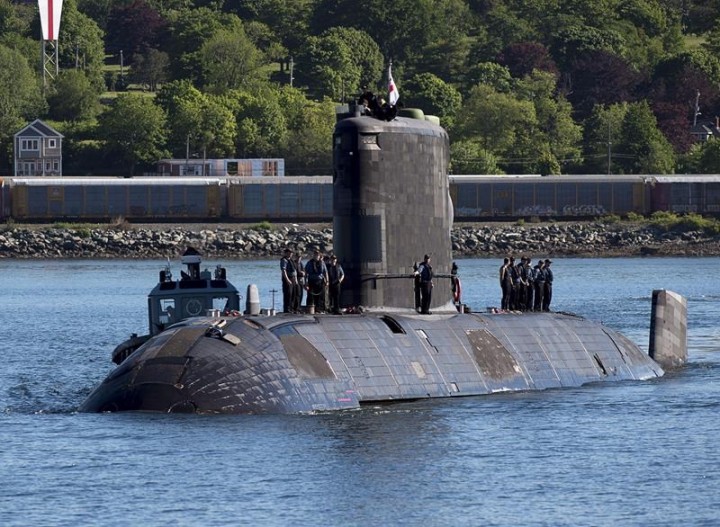OTTAWA — The federal government is at a crossroads on replacing Canada’s aging submarines, as cost considerations butt up against warnings about the need for such vessels and allies press ahead with their own plans.
The Royal Canadian Navy revealed in July 2021 that it had launched a long-anticipated push to replace the country’s four Victoria-class submarines, creating a special team to figure out exactly what the military needs in a new fleet.
The move came amid growing concerns about the need to start working on such a project given the age of Canada’s existing fleet and estimates that it would take at least 15 years to design and build new vessels.
Yet it also came absent a formal commitment from the Liberal government to build and operate a new submarine fleet after the Victoria-class vessels are retired in the mid-2030s — a commitment that still hasn’t been made nearly two years later.
Defence Minister Anita Anand’s spokesman on Tuesday described submarines as “one of Canada’s most strategic assets for conducting surveillance of Canadian and international waters, including the near Arctic.”
But he would not comment on whether the government is committed to replacing the Victoria-class fleet. He instead noted the government is reviewing its existing defence policy, released in 2017, to determine the military’s long-term needs.
Adam MacDonald, a former naval officer turned defence expert at Dalhousie University in Halifax, said the government is running out of time if it wants to have new submarines ready before the current ones are retired.
“Most people who really study this are basically saying there has to be a determination if you want to have a continuous submarine capability,” MacDonald said. “So you basically need a decision now or within the next year or so.”
The lack of political direction comes as the United States, Britain and Australia have put submarines at the heart of a new defence pact known as AUKUS, which aims to push back against Chinese ambitions in the Indo-Pacific region.
Those in the top ranks of the Canadian Armed Forces have repeatedly spoken about the importance of submarines.
“You’ve got somebody with an infantry background that’s advocating for submarines, so the Navy’s done something right,” chief of the defence staff Gen. Wayne Eyre said last week when asked at a conference about the military’s immediate needs.
But experts say there is no guarantee Ottawa will commit to spending the money needed to replace the Victoria-class, whose own costs and benefits have been hotly debated since they were purchased second-hand from Britain in 1998.
“I don’t think it’s a ‘for sure’ that we’re going to continue on having a submarine capability,” MacDonald said.
That’s because the Liberal government is facing other financial pressures. Those include escalating costs on other military procurements, such as the plan to build a new fleet of warships, and calls to rein in spending after nearly a decade of deficits.
“The financial environment that we find ourselves now in is increasingly precarious,” said University of Calgary defence analyst Rob Huebert, who worried the Liberals will end up “kicking the can down the road.”
“I can see all the arguments strategically for why we need subs,” Huebert said. “But even if we had a government that was committed to hard security, we have painted ourselves in such a bad corner, how do we get to it?”
Canada’s current fleet has not helped the Navy’s position. Touted as a deal when they were purchased from Britain for $750 million, they have since spent more time in dock for repairs and maintenance than at sea.
Ottawa has been forced to sink billions of dollars into the fleet over the past 20-plus years to address a series of problems and incidents including fires and faulty welding. There have also been several accidents during operations and testing.
Current and former military commanders nonetheless insist submarines are critical for defending Canada’s waterways as well as for successful military operations abroad, particularly as China and Russia rush to build their own fleets.
Describing oceans as a three-dimensional battlefield, retired vice-admiral Mark Norman said submarines are critical to knowing and controlling what is happening below the waves.
“To only worry about the surface ignores an entire layer of the problem,” he said.
“I’ve previously used the analogy of a police force trying to patrol the streets of a city, only to discover that an entire subterranean system exists that has been permitting the free movement of illicit activity without their knowledge.”
The AUKUS agreement appears to bolster such arguments, with the U.S. taking the unusual step of agreeing to share its nuclear-submarine secrets with Australia — only the second time it will have done so.
“The reality is that you’ve got a submarine arms-race developing,” Huebert said. “You’ve got submarine construction by the Chinese, the Japanese, the Americans in numbers you have not seen since just prior to the Second World War.”
Norman lamented the lack of a political commitment from the government for buying new submarines.
“I believe that’s sadly just a function of a lack of genuine interest or resolve to either accept the urgency of the problem or to use any political capital in support of a capability that no one understands.”
This report by The Canadian Press was first published March 14, 2023.
Lee Berthiaume, The Canadian Press
